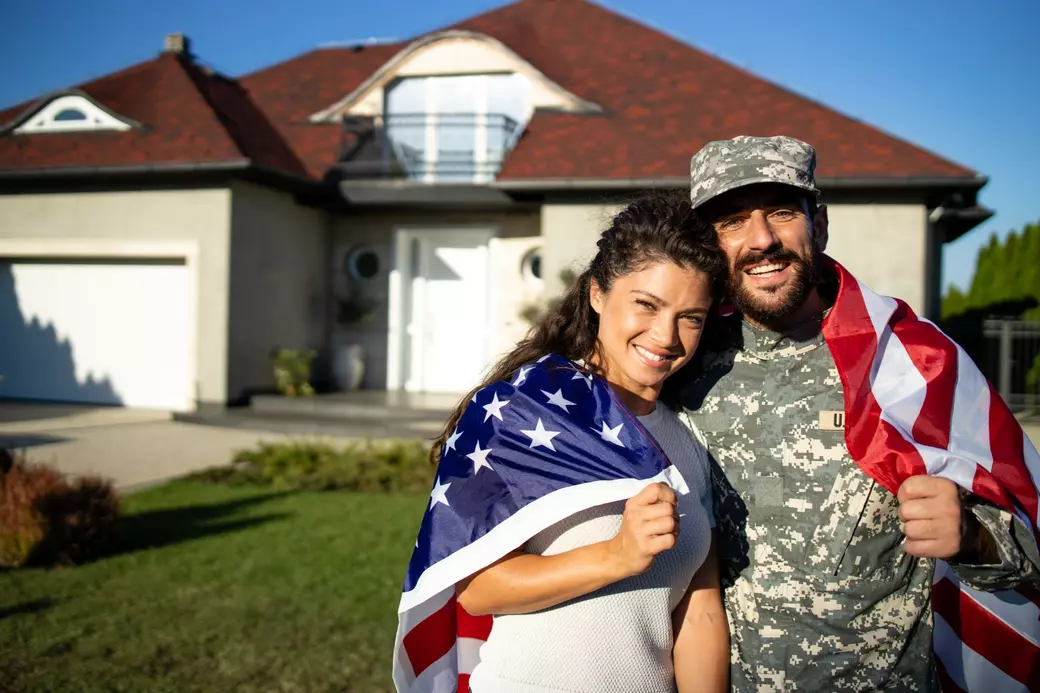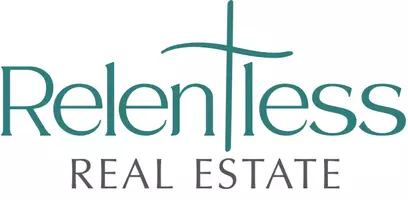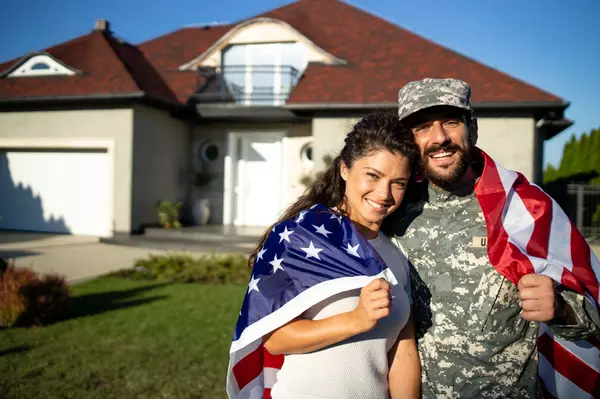What is a VA Loan?

Military Veteran Home Buying Power Secrets
If you are a military service member or veteran looking to purchase a home, you may have heard about VA loans. Do you really know what they are and how they can benefit you?
In this article, we explore the ins and outs of VA loans, including who is eligible, the benefits, how to qualify, and even how to find a military-friendly realtor who is well-versed in the VA loan process. We discuss the unique feature of assumable VA loans and provide an example of how they work.
If you're ready to navigate the VA loan process and secure your dream home, keep reading to uncover these military and veteran home buying power secrets.
Key Takeaways
- VA loans are a benefit for military and veterans to purchase a home with no down payment and lower interest rates.
- It's crucial to find a military friendly realtor who understands the VA loan process and can help expedite the home buying process.
- VA loans are assumable, meaning they can be transferred to another qualifying borrower, making it a valuable option for sellers and buyers.
What Really is a VA Home Loan?
A VA Loan is a mortgage option available to veterans that allows them to purchase a home without the need for a down payment.
One of the significant benefits of a VA Loan is that it eliminates the requirement for a down payment, making homeownership more accessible for veterans who may not have substantial savings. This feature sets it apart from conventional mortgages, where a down payment is typically necessary. VA Loans do not require private mortgage insurance (PMI), further reducing the costs associated with buying a home. Veterans may enjoy potentially lower interest rates with VA Loans compared to conventional loans, providing additional financial advantages.
Who is Eligible for a VA Loan?
Eligibility for a VA Loan is based on certain criteria such as service history, duty status, and in some cases, military spouses.
Service members who wish to determine their eligibility for VA Loans should first consider their service history. This typically involves specific periods of active duty, wartime service, or service in the National Guard or reserves. Duty status is also a crucial factor, with different requirements for active duty service members, veterans, and certain Reserve and National Guard members. Military spouses may also qualify for VA Loans under certain conditions, providing an opportunity for families to benefit from this supportive program.
What are the Benefits of a VA Loan?
The benefits of a VA Loan include no down payment, lower interest rates, and flexible occupancy requirements.
VA Loans provide an excellent option for veterans looking to purchase a home without the typical financial constraints often associated with traditional mortgages. With no requirement for a down payment, veterans can achieve homeownership with significantly less upfront cost, making it a more accessible option for those who may not have large savings. The potential for lower interest rates on VA Loans can result in substantial savings over the life of the loan, compared to conventional financing.
How to Qualify for a VA Loan?
To qualify for a VA Loan, applicants need to work with a VA-approved lender and undergo a loan approval process that includes a review of their credit report and credit score.
Working with a VA-approved lender is crucial as they specialize in handling VA Loans, understanding the intricacies of the process and ensuring a smoother experience for applicants.
The loan approval process involves verifying the applicant's eligibility based on their military service, income, and credit history.
One of the key factors that lenders consider is the applicant's credit report and credit score. A good credit score not only increases eligibility but also potentially results in a lower interest rate for the loan.
What is a Certificate of Eligibility?
A Certificate of Eligibility (COE) is a document that verifies a veteran's eligibility for a VA Loan based on their service history and duty status.
For veterans to acquire a Certificate of Eligibility, they typically need to apply through the Department of Veterans Affairs, either online, through a VA-approved lender, or by mail using Form 26-1880. This form requires details of the veteran's military service, including dates of service, character of service, and discharge information. Specific requirements that must be met for obtaining a COE may include minimum service length, depending on the era of service, and specific conditions during service, and meeting certain duty status criteria such as active duty service during wartime or peacetime.
What are the Credit Requirements for a VA Loan?
Credit scores play a crucial role in VA Loan eligibility, with minimum score requirements set by VA-approved lenders.
VA-approved lenders typically require a minimum credit score of around 620 to qualify for a VA Loan. Having a higher credit score can greatly benefit borrowers by securing more favorable loan terms such as lower interest rates and smaller down payments. To improve credit scores, individuals can focus on making timely payments, keeping credit card balances low, and avoiding opening multiple new accounts. Working on these aspects not only enhances creditworthiness but also increases the chances of approval for VA Loans."
What are the Income Requirements for a VA Loan?
Income requirements for a VA Loan include meeting residual income guidelines to ensure borrowers can afford their mortgage payments.
Residual income guidelines are a crucial aspect of VA Loans, as they focus on assessing a borrower's ability to cover not just their mortgage but also other necessary living expenses. This calculation aims to determine if the borrower has sufficient income left over after housing costs, taxes, and other debts are paid.
The residual income calculation considers factors such as family size, geographic location, and the loan amount. It is designed to ensure that borrowers have a stable financial situation and can handle unexpected expenses without financial strain.
How to Find a Military Friendly Realtor?
Finding a military-friendly realtor, like Evan Fraley, who is well-versed in VA loans and the specific needs of veterans is crucial for a smooth home-buying process.
Such a real estate agent can be instrumental in navigating the intricacies of VA loans, ensuring that veterans receive the best financing options available. They understand the complexities of the VA loan process, from eligibility requirements to the unique benefits it offers.
When looking for a VA-savvy agent, experience is key. Look for professionals who have a proven track record of assisting veterans in finding their dream homes. These agents are knowledgeable about military relocation, VA appraisal requirements, and potential challenges that may arise during the transaction.
Why is it Important to Find a Military Friendly Realtor?
Selecting a military-friendly realtor can streamline the home-buying process for veterans, ensuring they receive personalized assistance tailored to their unique circumstances.
One of the key advantages of partnering with a real estate agent who understands the needs of those who have served is their in-depth knowledge of VA loans. These professionals are well-versed in the intricacies of VA loan requirements and can guide veterans through the application process with ease. Military-friendly realtors often have connections with lenders who specialize in VA loans, making it easier for veterans to secure financing.
What Questions to Ask a Realtor about VA Loans?
When engaging with a realtor about VA loans, it's essential to ask about their experience with VA-savvy agents, the loan approval process, and any frequently asked questions relevant to VA home loans.
One key question to ask is, how familiar they are with the specific requirements and benefits of VA loans compared to conventional loans.
- Another important query is related to the timeline for loan approval and whether they have experience expediting the process for veterans.
- It is also crucial to inquire about any potential pitfalls or challenges that veterans might face during the home buying process using a VA loan.
- Understanding how the realtor communicates with the VA loan officer and other parties involved can give insight into their efficiency and reliability.
What is an Assumable VA Loan?
An assumable VA Loan is a type of mortgage that allows a qualified buyer to take over the seller's existing VA loan on the same terms and conditions.
This type of loan can be advantageous for both buyers and sellers in several ways. For buyers, assuming a VA loan means they can benefit from the lower interest rates associated with VA loans without needing to secure new financing. Buyers may avoid certain closing costs and fees that typically come with a traditional mortgage.
For sellers, having an assumable VA loan can make their property more attractive to potential buyers, potentially leading to a quicker sale. Sellers may also have the opportunity to avoid costly loan payoffs or prepayment penalties.
The process of assuming a VA loan involves the buyer qualifying with the lender, completing the necessary paperwork, and potentially paying a funding fee. Once approved, the buyer takes over the loan payments and assumes responsibility for the remainder of the loan term.
One of the key advantages of assuming a VA loan is the preservation of the original loan terms, including the interest rate and loan balance. This can be particularly beneficial if interest rates have risen since the loan was originated, as the buyer can secure a lower rate than what is currently available on the market.
How Does an Assumable VA Loan Work?
Assumable VA Loans enable buyers to purchase a property with an existing VA mortgage, assuming responsibility for the loan terms and conditions while avoiding the need for a new loan.
When a buyer assumes a VA loan, they essentially step into the shoes of the seller, taking on the existing loan balance and repayment schedule. This process can be highly advantageous as it often requires lower upfront costs, eliminates the need for a down payment, and may offer more favorable interest rates than obtaining a new loan.
- The steps involved in assuming a VA loan typically include qualifying with the lender,
- determining the loan's terms, and completing the transfer paperwork.
Buyers need to undergo a credit and employment check to ensure they meet the VA's eligibility requirements. Once approved, the buyer assumes the current interest rate, remaining loan balance, and repayment terms, making payments directly to the lender moving forward.
What are the Benefits of an Assumable VA Loan?
The advantages of an assumable VA Loan include potential savings on closing costs, lower interest rates, and a streamlined approval process for buyers.
When a buyer assumes an existing VA loan, they step into the shoes of the original borrower, taking over the loan balance and terms. This can lead to significant savings as there may be no need for a down payment or private mortgage insurance, which are common requirements in other types of loans.
The favorable interest rates associated with VA loans can mean lower monthly payments compared to traditional loans, easing the financial burden on the buyer. The simplified approval process that comes with assuming a VA loan can also expedite the home buying process, making it more efficient and less cumbersome for the buyer.
Example of How an Assumable VA Loan Works
In a scenario where a seller has an assumable VA Loan, a buyer can acquire the property by taking over the existing loan, provided they meet the lender's eligibility criteria.
Let's delve into a common example of how this process unfolds: The seller, let's call them Mr. Smith, decides to sell a house with an assumable VA loan. Along comes the buyer, Ms. Johnson, who is interested in purchasing the property. In this case, instead of seeking a new loan, Ms. Johnson can take over the existing VA loan from Mr. Smith, with the approval of the lender.
For Mr. Smith, this means a smoother selling process without having to pay off the current loan in full before transferring ownership to Ms. Johnson. On the other hand, Ms. Johnson benefits from the lower interest rates typically offered by VA loans, saving her money in the long run. Ms. Johnson may have to pay Mr. Smith any equity accrued on the property if the home is selling for more than the amount remaining on the loan. If Ms. Johnson has ability to pay Mr. Smith the difference between the sale price and the remaining loan amount, the process is fairly straightforward and can be of great benefit to both parties.
How to Navigate the VA Loan Process?
Navigating the VA Loan process involves understanding VA loan rates, managing credit reports, and anticipating closing costs associated with the purchase.
One of the key aspects to keep in mind when diving into the VA loan process is the fluctuation of VA loan rates. It's crucial to research current rates and understand how they can impact your monthly payments and the overall cost of your home over time. Regularly monitoring credit reports plays a vital role in ensuring their accuracy, as any errors could hinder your loan approval or result in less favorable terms.
Preparing for closing costs is another crucial step. These costs can vary and typically include fees for appraisal, inspection, title insurance, and more. Being aware of these expenses and setting aside funds for them in advance can help streamline the closing process and avoid any financial surprises.
What Documents are Needed for a VA Loan?
To apply for a VA Loan, borrowers must provide essential documents such as proof of income, employment verification, and details on assets and liabilities.
Income verification is crucial to demonstrate the borrower's ability to repay the loan and ensure financial stability. Employment details help lenders assess the borrower's job stability and income source. Asset and liability information give insight into the borrower's financial health and ability to handle debt. Along with these, borrowers may also need to submit documents such as tax returns, bank statements, credit history reports, and proof of Certificate of Eligibility (COE) for VA loans.
What are the Steps in the VA Loan Process?
The VA Loan process involves several key steps, including preapproval, property appraisal, loan underwriting, and the final closing.
After the initial step of preapproval, which establishes your eligibility for a VA loan, you must find a property that meets the VA's property requirements. This is where the property appraisal comes into play, determining the value of the home in relation to the loan amount. The appraisal ensures that the property is worth the loan amount, protecting both you and the lender. Once the property is appraised, the loan moves into the underwriting stage, where your financial background and the property's qualifications are thoroughly reviewed.
At the doorstep of your dream home?
Let our VA loan experts guide you through the final steps. Contact us today and turn your homeownership dreams into reality!
GET MORE INFORMATION






